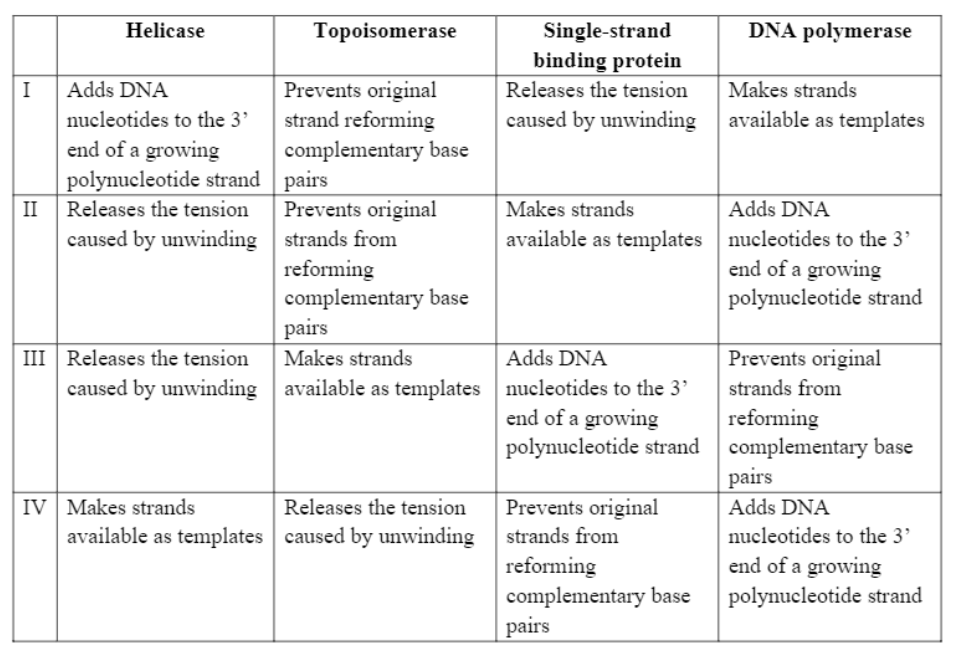The function of enzymes in the living system is to
Transport oxygen
Provide immunity
Catalyse biochemical reactions
Provide energy
The correct Answer is:C
Step-by-Step Solution:
1. Understanding Enzymes:
- Enzymes are complex organic molecules primarily composed of proteins. They play a crucial role in biological systems.
2. Function of Enzymes:
- The primary function of enzymes is to catalyze biochemical reactions. This means they speed up the rate of these reactions, making them occur more efficiently.
3. Mechanism of Action:
- Enzymes increase the rate of biochemical reactions by lowering the activation energy required for the reaction to proceed. This makes it easier for the reactants to convert into products.
4. Role in Metabolism:
- Enzymes are involved in nearly all metabolic processes within living organisms. Each metabolic reaction is typically facilitated by a specific enzyme.
5. Elimination of Incorrect Options:
- Option A: Transport oxygen - This is the function of hemoglobin, not enzymes.
- Option B: Provide immunity - Immunity is provided by immune cells (like T cells and B cells), not enzymes.
- Option D: Provide energy - Energy is derived from macromolecules (like carbohydrates and lipids), not directly from enzymes.
6. Conclusion:
- The correct answer to the question regarding the function of enzymes in living systems is that they catalyze biochemical reactions.
Final Answer:
The function of enzymes in the living system is to catalyze biochemical reactions.
---
- Enzymes are complex organic molecules primarily composed of proteins. They play a crucial role in biological systems.
- The primary function of enzymes is to catalyze biochemical reactions. This means they speed up the rate of these reactions, making them occur more efficiently.
- Enzymes increase the rate of biochemical reactions by lowering the activation energy required for the reaction to proceed. This makes it easier for the reactants to convert into products.
- Enzymes are involved in nearly all metabolic processes within living organisms. Each metabolic reaction is typically facilitated by a specific enzyme.
- Option A: Transport oxygen - This is the function of hemoglobin, not enzymes.
- Option B: Provide immunity - Immunity is provided by immune cells (like T cells and B cells), not enzymes.
- Option D: Provide energy - Energy is derived from macromolecules (like carbohydrates and lipids), not directly from enzymes.
- The correct answer to the question regarding the function of enzymes in living systems is that they catalyze biochemical reactions.
The function of enzymes in the living system is to catalyze biochemical reactions.
Topper's Solved these Questions
- BOOK - AAKASH SERIESCHAPTER - BIOMOLECULESEXERCISE - EXERCISE - II (Lipids)18videos
BIOMOLECULES
- BOOK - AAKASH SERIESCHAPTER - BIOMOLECULESEXERCISE - EXERCISE - II (Nucleic acids)53videos
BIOMOLECULES
- BOOK - AAKASH SERIESCHAPTER - BIOMOLECULESEXERCISE - EXERCISE - II (Amino acids)13videos
BIOMOLECULES
- BOOK - AAKASH SERIESCHAPTER - BIOLOGICAL CLASSIFICATIONEXERCISE - EXERCISE-III (Previous AIPMT/NEET Question)37videos
BIOLOGICAL CLASSIFICATION
- BOOK - AAKASH SERIESCHAPTER - CELL CYCLE AND CELL DIVISIONEXERCISE - Exercise-III18videos
CELL CYCLE AND CELL DIVISION
Similar Questions
Knowledge Check
- Question 1 - Select One
Enzymes in the living systems
Aprovide energyBprovide immunityCtransport oxygenDcatalyse biological reactions.
What is the function of enzyme nuclease in the pancreatic juice?
View SolutionAssertion:Sucrose is sweetest in taste
Reason : Sucrose is converted by the enzyme invertase present In living systems to glucose and fructoseView SolutionWhich of these is the correct function of enzymes/ Protein used in DNA replication ?
 View Solution
View SolutionProteins perform many physiological functions. For example, some functions as enzymes. One of the following represents an additional function that some proteins discharge
View SolutionWhat is the function of repeater in a communication system?
View SolutionOne function of parasympathetic nervous system is
View SolutionProteins perform many physological functions. For example, some proteins function as enzymes. One of the following represents an additional function that some proteins perform
View Solution

